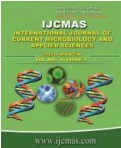


 National Academy of Agricultural Sciences (NAAS)
National Academy of Agricultural Sciences (NAAS)

|
PRINT ISSN : 2319-7692
Online ISSN : 2319-7706 Issues : 12 per year Publisher : Excellent Publishers Email : editorijcmas@gmail.com / submit@ijcmas.com Editor-in-chief: Dr.M.Prakash Index Copernicus ICV 2018: 95.39 NAAS RATING 2020: 5.38 |
Calcareous and alkaline nature of the soil under non-traditional citrus growing track is the major drawback for low yield and poor fruit quality of mosambi with increased granulation problem. Generally, these type of soil hinders the smooth up take of micronutrient to the plants from soil. Hence, the present investigation was design to evaluate the impact of foliar feeding of micronutrients on growth, yield and fruit quality of sweet orange (Citrus sinensis (L.) Osbeck) cv. Mosambi. The observations revealed that treatment combination of Zn @ 0.5%+ Fe @ 0.2% + B @ 0.3% + Cu @ 0.1% followed by B @ 0.3% + Fe @0.2% and Zn @ 0.5% + B @ 0.3% were most effective for improving vegetative growth of sweet orange cv. Mosambi in terms of plant height and trunk girth increment, canopy volume and growth of current season shoot. The commencement of reproductive growth in terms of 50% bloom after bud break as well as full bloom after bud break with maximum flowering and fruit setting was also obtained in in Zn @ 0.5% + Fe @ 0.2% + B @ 0.3% + Cu @ 0.1% spray followed by B @ 0.3% + Fe @0.2% and Zn @ 0.5% + B @ 0.3%. the yield was calculated maximum in the treatment consist of Zn @ 0.5% + Fe @ 0.2% + B @ 0.3% + Cu @ 0.1% (8.06 t acre-1). Further, fruit quality attributes in terms of sugar:acid ratio, sucrose content, carotenoid content and edible: non-edible ratio was recorded maximum with Zn @ 0.5% + Fe @ 0.2% + B @ 0.3% + Cu @ 0.1% spray (41.88, 4.44%, 0.59 mg 100 g-1).Therefore, three foliar spay of Zn @ 0.5%+ Fe @ 0.2% + B @ 0.3% + Cu @ 0.1%from May- July may be recommended to get maximum yield of better quality mosambi fruit under non-conventional citrus growing track having calcareous and alkaline nature of soil.
 |
 |
 |
 |
 |